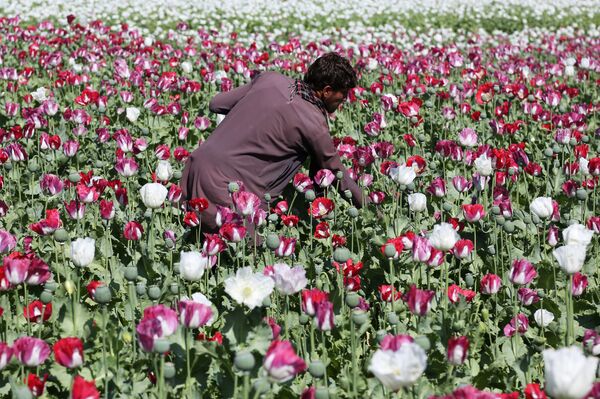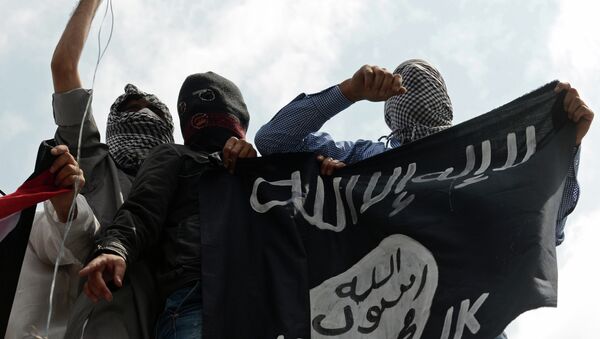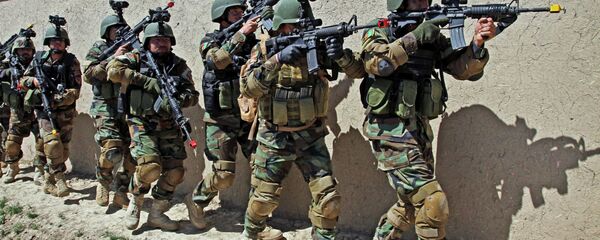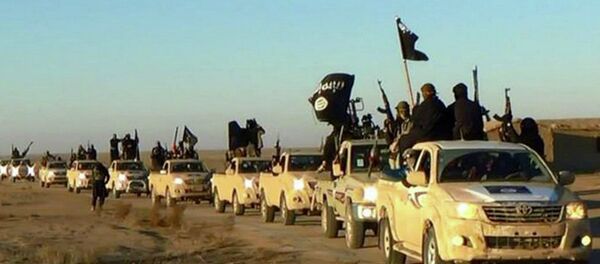Earlier this month, a band of mysterious fighters pushed through Taliban-controlled territory in eastern Afghanistan. According to witnesses speaking to Reuters, hundreds of insurgents rode through Nangarhar province, burning Taliban opium fields as they went.
This new band of insurgents fought under the banner of the self-proclaimed Islamic State terror group.
"They (IS loyalists) came in on many white pickup trucks mounted with big machine guns and fought the Taliban," said Haji Abdul Jan, a tribal leader from Achin district. "The Taliban could not resist and fled."
The IS fighters have acted quickly, already seizing territory in at least six districts in Nangarhar province, with fighting still ongoing in Khogyani and Pachir Agam districts. Witnesses describe the group’s black flag being flown across the province. Foreign fighters expound a strict Islamic code in mosques.
"They tell them about Islam and what people should do and should not do," Abdul Wali, a refugee from the region, told Reuters.
"They (ISIL) burned poppy fields in Shadal village and banned shops from selling cigarettes," a tribal elder from Spinghar added.
Other witnesses describe the IS fighters beheading captured Taliban commanders.
The strategies appear to be working. By destroying the Taliban’s opium production, IS cuts their rival off financially, and many villagers reportedly prefer living under the new rule.
"Unlike the Taliban, they don’t force villagers to feed and house them," Jan said. "Instead, they have lots of cash in their pockets and spend it on food and luring young villagers to join them."

The source of that money is a cause for international concern. While both the United States and Afghan officials have downplayed the suggestion that these fighters represent a true extension of the Islamic State, the fighters’ vast stockpiles of cash seem to suggest otherwise. Officials cite a lack of evidence to suggest that the new militant group is taking orders directly from the Middle East, but many witnesses report that the insurgents have been relying on gold to fund their operations, which is not a common sight in the region.
In December, NATO officially withdrew from combat operations in Afghanistan, entrusting the nation’s stability to the government in Kabul. While Afghan security forces maintain security in most of the country, the Taliban insurgency had remained strong in the eastern province of Nangarhar.
Still, despite the government’s goal of weeding out insurgency pockets, the Afghan army has not yet taken action against IS, preferring instead instead to let them battle the Taliban.
"They haven’t attacked us, and we haven’t engaged them either," Achin district chief, Malek Islam, told Reuters.
While playing both sides against each other may seem like a tempting solution in the short term, the quick spread of IS fighters through Iraq and Syria could prove indicative of the long-term threats the group poses to Afghanistan.
The Islamic State has already showed frightening signs of spreading beyond the borders of war-torn Syria and Iraq. The group has also taken advantage of the chaos in Libya to secure a footing in North Africa, and also has loyal factions in Egypt and Algeria, and Nigeria. Growing support in Afghanistan is the latest indicator of the group’s far-reaching intentions.
A letter reportedly written by Abu Bakr al-Baghdadi, proclaimed by followers as the group’s caliph, was distributed through Nangarhar. In a blatant effort at recruitment, it reads: "All Mujahideen fighters are invited to carry out this holy war under one flag, which is the Islamic State."




